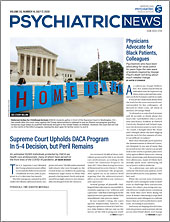I imagine that upon admission to a psychiatric hospital, patients do not anticipate physical touch to be a key aspect of their road to healing. Even as their physician, I do not document in my treatment plan considerations regarding each patient’s physical touch needs and boundaries. After all, this is a psychiatric hospital, where our substrates are emotions, cognitions, and behavior. The physical body—outside of the brain, medication-metabolizing pathways, and adverse effects—often becomes a secondary or tertiary thought in routine, hurried practice.
Perhaps this is why I did not anticipate a pandemic mandating social or physical distancing to be something that greatly affected the care I provide on the psych ward. I am not an ENT eliciting respiratory secretions or a pediatrician swabbing virus-prone children. I thought touch could be swiftly eliminated from my interactions and distance safely kept from patients suffering from mental health struggles.
What I’ve found is that I had overlooked the myriad ways empathic, orienting touch had pervaded my interactions with patients.
The first time that I surprisingly found myself a touch-strapped psychiatrist was on a midnight call shift in an emergency department (ED) as the pandemic began to roar locally in March. A 96-year-old veteran—days away from her 97th birthday and inviting the whole ED staff to the celebration—had made a suicidal statement after losing control of yet another bodily function in her late years. She was whisked to the ED in the middle of a night and kept in the hallway, her tiny body bundled in pajamas and blankets, so that staff could keep a close eye on her and her needs.
This patient was the social belle of the ED. She had a habit of grabbing staff’s hands and drawing them to her chest in a gesture of gratitude. Occasionally she would kiss a hand for good measure.
Before the pandemic, I would have noted the gesture in my mental status exam and read it as a sign of the patient’s desire for connection and socialization. I would have been sure to wash my hands before and after and encouraged the patient to avoid kissing hands while in an ED, notoriously crawling with all sorts of potential superbugs.
That night, however, I found myself in uncertain territory. This familiar ED felt like an alien place, where I needed to note my actions more conscientiously—did I just touch my face? Can I adjust my mask? Maybe I should get an extra dollop of hand sanitizer, just to be sure?
I suddenly felt shame when the patient managed to grab my hand, and I knew I would feel further ashamed whether I pulled away or allowed her to pull my hand close.
Since March, I have felt other natural inclinations uncomfortably inhibited: to pat a patient’s elbow as he sobs over his recently passed wife of 70 years, to hug a patient when she throws her arms open before she walks out the unit doors after a remarkable recovery from medically induced psychosis, to step closer to my colleagues and attendings when we are conversing. Instead I have had to stop myself—to let the patient sob and offer only verbal condolences and halt the hug and—still plagued with uncertainty—agree to an elbow bump when offered as an alternative. I have had to take a step back from those whom I am learning from and among and strain a little harder to hear what they are saying through their masks.
I thought we would be treating the emotional strain of the pandemic. I didn’t think the pandemic would lead to so many questions about what is the better choice—to touch and risk infection or to allow a patient to inhabit his sob-wracked body all alone—when a patient before me cries and his blue surgical mask darkens with tears.
The pandemic is nudging me to honor the potency of the laying on of hands, even for psychiatrists. We know from the academic literature the deeply important benefits of human touch, as well as the potential for unwanted touch to cause trauma and suffering.
I hope our field can be more conscious of the immense power of touch and approach it with ever-more intention. We are healers of the mind, yet the skin is the organ where the mind encounters the external environment and comes to understand itself as harmoniously attuned to or tragically severed from its world. ■

